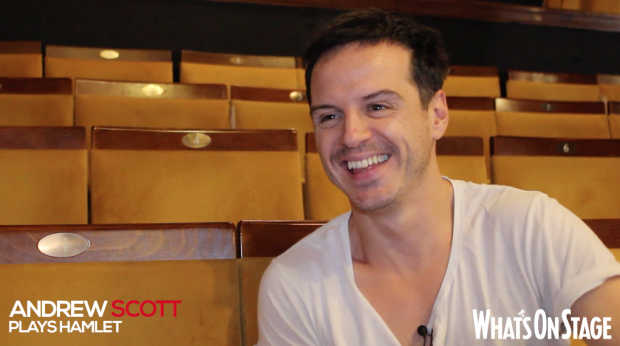Review: Hamlet (Harold Pinter Theatre)
When this production of Hamlet, starring Andrew Scott, opened at the Almeida Theatre in March, I felt I had seen one of the great productions of Shakespeare’s play in my lifetime. Its transfer to the West End has done nothing to lessen that sense.
The triumph of Robert Icke‘s direction and Scott’s sensational central performance, is to make Hamlet feel like a new play. It takes the most familiar plot in the English theatre and the most quoted words in the English language and reveals them as fresh and vital.
Yet it does this without ever diminishing or traducing Shakespeare. The version performed is long and faithful; the words are all there. It is the vision that is different. It’s like molten literary criticism, treating every scene with reverence but examining its meaning with new eyes.
Revelations come both big and small. Its setting is contemporary – Hildegard Bechtler’s set – which looks stunning in this new setting – is a very modern palace, with comfortable lounges, dazzling fairy lights, and a battery of security screens controlling entry. When the Ghost (authoritative David Rintoul) first appears on those screens, prowling the cellars bringing loud bursts of static, it is genuinely frightening and exciting. It is also a clever piece of stagecraft: we know what he looks like because our first introduction to him is a newsreel of his funeral, screened in Danish, at the very beginning of the play.
When Scott’s Hamlet hugs his father, something already hinted at is confirmed: this is a Hamlet about love, about families that are fractured and destroyed, not because they are evil but because they make bad and good choices driven by the most elemental human emotions.
This applies not only to the royal family – where Juliet Stevenson‘s Gertrude and Angus Wright‘s Claudius are so physically besotted that they can’t keep their hands off each other – but to the Polonius, Ophelia, Laertes clan as well. It is Jessica Brown Findlay‘s devotion to her father (a wonderfully bumbling but warm Peter Wight) that makes her betray Hamlet and turns a gawky, lovable girl into a traumatised, terrified wreck; it is Gertrude’s adoration of Hamlet that makes her finally see through Claudius (we know the minute it happens) and ultimately kill herself to save him.
None of Icke’s interventions are gratuitous. He is not making Shakespeare modern because he has a few gimmicky ideas that he wants to impose. Every single detail is carefully thought through and explained, sometimes by creating silent scenes between scenes and sometimes simply by paying strict attention to even the smallest line; I have never, for example, seen the relationship between Hamlet and his friend Horatio better realised, and this is in part achieved by making the simple phrase 'my lord' full of meaning.
Every aspect of the production is sensitively executed (hats off to the entire team), but at the heart of it all is Scott’s Hamlet, embodying in his stillness and his quietly conversational style all the staging's merits.
We in the audience are his confidantes in soliloquies performed right at the front of the stage. What he manages to do is to make those famous speeches unfamiliar, full of thought and feeling. There is not a single moment when Scott declaims a line; he talks to us, unpacking his heart, revealing his grief and his suicidal despair. His Hamlet is a man longing to make things right. In the radically rethought final scene, his discovery of a kind of hope is almost unbearably moving. I found I was crying.
One of Icke’s interventions, to create the bond between the audience and Hamlet, is to raise the house lights when Hamlet is instructing the players how to perform. When he asks them to fulfil their duty to ‘show… the very age and body of the time his form and pressure' and 'hold the mirror up to nature', he seems to be speaking about the production in which he is performing. Icke has indeed fulfilled his ambition to make a Hamlet for the Netflix generation.
But he has done something more; he has revealed it as a resonant play for today. In Scott, he has a Hamlet for the ages, a performance that will go down in history.
I could write about it forever, but let me say plainly, this is an unmissable production for anyone who cares about theatre. Just go and judge for yourself.
Hamlet runs at the Harold Pinter until 2 September.
Click here to buy tickets











